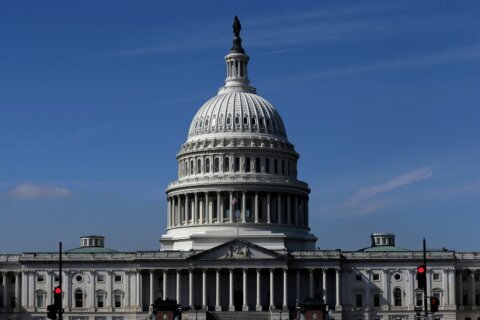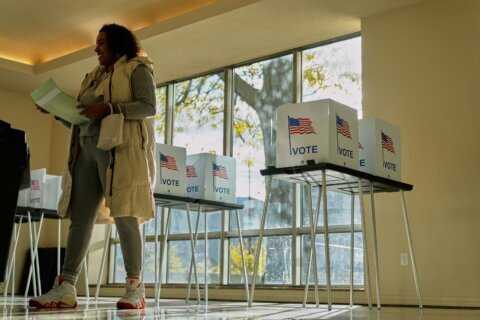D.C. started early voting this week, allowing residents to submit ballots in the presidential race ahead of Nov. 3.
It wasn’t until the 1964 election that D.C. residents could even vote for president, owing to its unique history and the fact that the District of Columbia is not a state.
While it has a long way to go, this election could have an impact on efforts to make D.C. the 51st state.
- Q:
Why couldn’t D.C. residents vote for president until 1964?
- A:
Congress passed legislation in 1801 that formalized new boundaries for the District of Columbia, from land ceded by Virginia and Maryland. That came about as the federal capital was transferred from Philadelphia to Washington. As a result, residents lost the right to vote for president and vice president because they no longer lived in a state.
It wasn’t until 1961 that Congress and the requisite number of states had approved the 23rd Amendment, which gave D.C. three electoral votes. The first presidential election after the amendment was approved was the 1964 race between Democrat Lyndon B. Johnson and Republican Barry Goldwater. That was the first modern-day presidential contest in which D.C. residents were able to make their votes count in the race for the White House.
D.C. first voted for its shadow delegation in 1990, 200 years after the federal city was founded.
- Q:
Fast forward to 2020: What’s the current status of D.C.?
- A:
D.C. license plates since 2000 have had some form of “Taxation Without Representation.” That reflects the continuing situation in which D.C. residents pay federal income taxes but do not have a voting member in Congress.
D.C. Del. Eleanor Holmes Norton, as a member of the House, can craft legislation, but she does not have a floor vote like lawmakers from the nation’s 50 states. D.C. also does not have two U.S. Senators as all other states do — though it has two “shadow senators” whose position is largely symbolic.
That of course means D.C. had no say in this week’s floor vote on the confirmation of the newest member of the U.S. Supreme Court, Justice Amy Coney Barrett.
- Q:
What about the legislation that passed to make D.C. the 51st state?
- A:
This summer, for the time ever, the House of Representatives passed legislation that would make D.C. the 51st state. The 232-180 vote for H.R. 51 was a big victory for statehood advocates.
The last time the House voted on statehood in 1993, it failed on a 277-153 vote. The latest legislation was supported by all but one Democrat and has the strong support of House Speaker Nancy Pelosi and House Majority Leader Steny Hoyer of Maryland.
For many years, Hoyer had opposed statehood because of uncertainty over how it would affect Marylanders.
- Q:
What about getting a statehood bill through the U.S. Senate?
- A:
The statehood legislation this year has had another first, getting placed on the Senate calendar.
But that doesn’t guarantee a floor vote, and Senate Majority Leader Mitch McConnell has shown no interest in putting it up for one. Some Senate Republicans, however, argue that the legislation should be put up for a vote. They are certain it would go down to defeat — at least while the GOP has control over the Senate.
- Q:
What if Democrats gain control of the U.S. Senate and/or the White House?
- A:
The most critical steps for statehood to have any chance of moving forward rely on major changes linked to the election.
Democrats would need to have a net gain of three Senate seats if Joe Biden wins the election, or a net gain if President Trump is re-elected.
If President Trump is reelected, he has said he would veto the D.C. statehood bill. If Democrats were to regain control of the Senate and Joe Biden were elected, it’s possible statehood could come closer than ever to actually taking place.
But it would still face plenty of challenges. There was a point when Democrats controlled the House, Senate and the White House, when President Barack Obama was in office. But statehood during the period made little progress. Advocates say this time would be different, since there is overall support for it across the Democratic Party.
- Q:
What legal hurdles would remain?
- A:
Even if Joe Biden is elected and a Democratically-controlled Senate were to approve the D.C. statehood bill, it would likely still face significant legal challenges.
The 23rd Amendment would need to be repealed, and congressional Republicans have indicated they would fight the effort to give D.C. a voting House member, as well as two U.S. Senators, because they would all probably be Democrats.
Republicans have indicated they would challenge the legislation on legal grounds, which could end up before the Supreme Court. That could mean years of legal struggles, through Norton and supporters of the legislation believe it is on firm legal ground.








